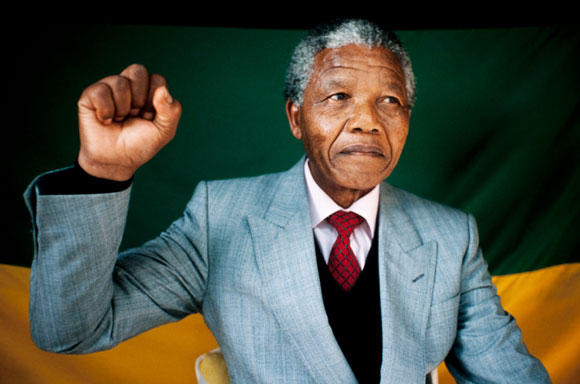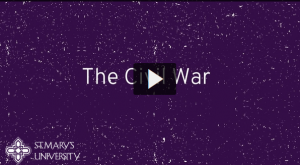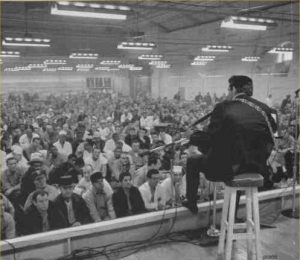Winner of the Spring 2019 StMU History Media Award for
Article with the Best Title
“I have fought against white domination, and I have fought against black domination. I have cherished the ideal of a democratic and free society in which all persons will live together in harmony and with equal opportunities. It is an ideal which I hope to live for and to see realized. But if it needs be, it is an ideal for which I am prepared to die.” 1
The world does not split between only black and white or good and bad. Shades of gray overtake our everyday lives and can make it difficult to navigate ethical dilemmas. Laws and rules do not necessarily make things clearer, nor black and white. Some rules, even those repeated throughout history, may neither be ethical nor positive for people or the societies on which these laws are imposed. If one breaks a law, one can be indicted as a criminal. However, breaking unjust laws provides the philosophical roots of civil disobedience and the motivation of freedom fighters. Nelson Mandela broke the highest law of his land and was tried for treason, not once, but twice. Yet, most recognize Nelson Mandela’s act as justified and he continues to be held in our highest regards, even winning a Nobel Peace Prize. How can one commit treason, be sentenced to life in jail, and still be one of the most beloved leaders and symbols of freedom around the world? Because Nelson Mandela fought for the freedoms of all his people, he fought against an unjust government determined to exploit and dehumanize all people of color, even the indigenous, the legitimate people of the land. Nelson Mandela did not betray the people; he committed treason against an oppressive government for all the right reasons. His world was literally divided into black and white, where white was always lawful, and Africans were always wrong. Mandela fought against laws that had no legitimacy.
On June 12, 1964, the courthouse and the streets around it were filled with those waiting to hear the verdict against Nelson Mandela and eight others during the Rivonia Trials. Judge Quartus de Wet delivered the news that these nine activists were sentenced to life in prison on the charges of conspiracy and sabotage, noting that the actions Mandela and the others committed were “in essence one of high treason” though he did not go as far as to implement the highest form of punishment in accordance with treason.2 The Rivonia Trials were supposed to end Mandela’s fight for justice for South Africa but in fact it only provided him the greatest international stage ever.

Mandela’s first arrest happened in 1952 when the African National Congress (ANC) and National Youth League was being led by Nelson Mandela. He organized a campaign called the “Campaign of Defiance against Unjust Laws,” which was the largest non-violent protest that South Africa had ever seen. The Defiance Campaign was also the first campaign to have all races included in one party in defiance of Apartheid rules by the ANC. 3 Mandela and the other leaders of the Defiance Campaign convinced hordes of volunteers to refuse carrying the books that designated their racial status and to go into the parts of the cities that were forbidden to them. Moreover, the Youth League defied curfews and violated segregation in governmental businesses, such as train stations and post offices. Despite the non-violent nature of the protests, the government became increasingly more worried about the protestors. Members of the Defiance Campaign were frequently arrested for the crimes they committed, but most were minor offenses and were short term prison sentences. This did nothing to stop the influx of volunteers. The numbers rose from 7,000 to 100,000. 4 In December 1952, Mandela was, along with nineteen others, charged for violating the Suppression of Communism Act. The government sentenced them to nine months in jail.
Four years later, in 1956, Mandela was arrested for the second time, during a raid on him home. In his autobiography, “Long Walk to Freedom,” he recalls his arrest that night, asking the arresting officer questions about overpowering him. When the officer said Mandela was playing with fire, he responded with “Playing with fire is my game.” 5” Mandela was put on trial and charged with treason, alongside 155 others, in what would become known as the “Treason Trial.” Four very long years later, the courts eventually found all defendants not guilty. The Treason Trial lasted four years for a number of reasons, mainly the number of people on trial. Defense Lawyer Israel Maisels argued that these individuals were not guilty because “Treason is a crime distinguished by the means used rather than the end” aimed for. 6
In 1960, the ANC was banned and when the trials concluded, Mandela, fearing for his life, fled to the underground, and eventually out of country, first Sudan, then other African countries and London, with a fake passport. During his time under ground and outside the country, the banned ANC gave him permission to gather the forces necessary to create and build an army, essentially taking an organization that treated nonviolence as its core, to a different kind of organization, with a future none could ever predict. 7

Mandela’s return to South Africa would lead to his third, and final, arrest, but not his last trial. Within days of returning, on August 5, 1962, on a drive to a meeting, Mandela was pulled over ending his seventeen months of unrestricted freedom he enjoyed outside of the country. 8 He was arrested and charged with five years imprisonment upon reentering South Africa for leaving and returning to the country without the proper paperwork and inciting violence. It was in this trial that Mandela fully realized who he could be in this fight for justice. He realized that he was “the symbol of justice in the court of the oppressor, the representative of the great ideals of freedom, fairness, and democracy in a society that dishonored those virtues. [He] realized then and there that [he] could carry on the fight even within the fortress of the enemy.”9”
This leads us back to where we started: The Rivonia Trials, which ended in twenty seven years of Nelson Mandela’s life in prison before becoming the first black Head of State for South Africa. In 1948, Apartheid became the system of governance and norms imposed on South Africans. Apartheid refers to total racial segregation, keeping white apart from all people of color. Under Apartheid, the minority led white government of South Africa divided the population in “whites”, “coloreds,” and “blacks.” Under Apartheid, many laws were passed that further segregated the country, like the Bantu Authorities Act in 1951, which designated areas where blacks were forced to resettled. 10 After spending 27 years in jails, and surviving from tuberculosis, Mandela’s fight had only but started. He strongly opposed De Klerk while working and negotiating with him to set up the rules for the first truly democratic elections in 1994. Unsurprisingly, the ANC and its presidential candidate, Mandela, won the election and proceeded to a peaceful tradition of power. Apartheid had been ended by parliament a few years earlier in order to pave the way for more democratization. Mandela purposefully did not seek reelection and went on to serve with the UN as a Special Envoy to help negotiate peace in other areas of the Africa Continent. While Mandela passed on December 5th, 2013, we should heed his words of advice that one cannot rest too long at the top of the hill for our freedom comes with many responsibilities and neither is our walk yet completed.
“I have walked that long road to freedom. I have tried not to falter; I have made missteps along the way. But I have discovered the secret that after climbing a great hill, one only finds that there are many more hills to climb. I have taken a moment here to rest, to steal a view of the glorious vista that surrounds me, to look back on the distance I have come.11”
“But I can rest only for a moment, for with freedom come responsibilities, and I dare not linger, for my long walk is not yet ended. 12”
- Nelson Mandela, Speech at Rivonia Trial, April 20 1964, The Telegraph, https://www.telegraph.co.uk/news/worldnews/nelson-mandela/10140564/Nelson-Mandelas-address-from-the-dock-at-the-Rivonia-Trial.html . ↵
- The State vs. Nelson Mandela and Others, Supreme Court of South Africa (June 12, 1964). ↵
- Sahoboss, “Defiance Campaign 1952,” South African History Online, March 19, 2018 http://www.sahistory.org.za/topic/defiance-campaign-1952. ↵
- Marcia Amidon Lusted, “Peaceful Protest,” Cobblestone 29, no. 4: 40, 2008. ↵
- Nelson Rolihlahla Mandela, Long Walk to Freedom, (Randburg: Macdonald Purnell, 1994):23. ↵
- Hisotircal Papers, The Treason Trial, Original Transcript, University of Witwatersrand and Johannesburg, http://www.historicalpapers.wits.ac.za/inventories/inv_pdfo/AD1812/AD1812-I1-001-jpeg.pdf . ↵
- “Timeline,” Nelson Mandela Foundation, Accessed April 08, 2019 https://www.nelsonmandela.org/content/page/timeline. ↵
- Nelson Rolihlahla Mandela, Long Walk to Freedom, (Randburg: Macdonald Purnell, 1994):49. ↵
- Nelson Rolihlahla Mandela, Long Walk to Freedom, (Randburg: Macdonald Purnell, 1994):49. ↵
- Salem Press Encyclopedia Research Starters, 2014, s.v. “Apartheid,” by Lucas, Emma T. ↵
- Nelson Rolihlahla Mandela, Long Walk to Freedom, (Randburg: Macdonald Purnell, 1994). ↵
- Nelson Rolihlahla Mandela, Long Walk to Freedom, (Randburg: Macdonald Purnell, 1994). ↵



63 comments
Lashanna Hill
This was an awesome explanation of what caused one of the greatest leaders on the planet to embark on his destiny. It was very ironic to read how they were able to apprehend Mandela behind paperwork and inciting violence. When his peaceful famous stance even inspired Dr. Martin Luther King Jr during the Civil Rights era.
Makenzie Hockensmith
I found the introduction of this article to be extremely compelling; it really drew me in with the way it equated black and white to the rest of the world, and I thought it tied the whole premise of the article together very well. I think this article did a good job of exploring political security in how it examined Mandela’s different trials and arrests, as well as the political climate of South Africa and his ultimate rise to power. I think something that added to this article was the proper use of Mandela quotations when describing situations that truly put his thoughts and opinions into perspective with the environment as a whole; it felt like you gave life to his story through your use of his quotations, which I think is very unique (and it really just made me want to read his biography). The only feedback I have is to maybe proofread one more time before publishing, as I caught a few typos when reading the article and they unfortunately distracted me from the story as a whole. Otherwise, well done!
Joshua Hall
South Africa matters today because of its close association with Russia and China. Recently South Africa held joint naval drills with both nations. The focus of the article was on Nelson Mandela and his struggle for freedom. South Africa cozying up with authoritarian states that he spent his life fighting against is very sad. The most compelling part of the article is the length of his struggle. As someone who is young I cannot fathom fighting for so long. He must have been riddled with doubt. Placing myself in his position is a unique thought experiment. It instills in me immense gratitude for having been born in the US.
The article was very short. That may have been the assignment so I cannot critique that. My question is what was the purpose of the article? Was it intended to be a brief biopic of Nelson Mandela?
Haley Ticas
Nelson Mandela is one of the most prominent figures in history. He is a true hero that gave up everything to fight for his people and fight for what he believed was right, and he has been an inspiration for generations to come. Im glad to continue to learn ad read more about him even as i grow older and go through school. The quotes at the end of the article really strengthened the article and helped make more of an impact on the reader. Great job!
Edward Cerna
Everyone knows about Mandela and all the great things he was able to achieve and so I liked how this article kind of told the story of how everything came to be. He has to overcome such great obstacles in order to find the success that he had. He has brought such great change and it was only possible because he never gave up. I did not know about the severity of the racial discrimination that was in South Africa. This article was very well written and I am glad it gave more of an insight of such a great leader.
Victor Rodriguez
What an inspiring and motiving article about an international figure like Nelson Mandela. Nelson Mandela led a whole country to peace and found important human rights to many people. It is outstanding how Nelson Mandela faced so many challenges and obstructions in order to accomplish his goal. However, Mandela was determine to bring the best into South Africa. The human rights, unity, and peace led South Africa and into a progressive state in a nation of transition.
Camila Garcia
The quote the author added at the end really added a lot to the piece. I like the context that the author added about apartheid it make the article flow really well. I really like how the author made Mandela the sole focus of the article. I knew he was an influential figure, however this article brought to light his struggles.
Danielle Slaughter
Hey, Auroara-Juhl.
This was a fantastic article in describing the life, times, and righteous crimes of Nelson Mandela. If treason means freedom from injustice, then treason so it shall be. Mr. Mandela was an inspiring figure in life, and continues to be so in death.
South Africa has a tragic history of apartheid and violence, but it can also be held up as an example of how triumph can overcome tragedy. While the nation still has a long way to go in achieving true equality, Nelson Mandela took that first giant leap into securing its inception. Hopefully, with time and effort, South Africa can arise from that dark shadow and prosper.
Marian Reyes
What I liked most about this article is the explanation of the harm Apartheid caused without dwelling on it to the point of over taking the narrative of the article. First and foremost, this article was about Nelson Mandela’s fight for freedom from an oppressive government. It was a fight against Apartheid and not about how the South African people had been hurt by it.
Allison Grijalva
Thank you for taking the time to research Nelson Mandela and write this great article about him. I think he is a very iconic and influential figure in history who shows how unrest and injustices can manifest within someone and turn into a revolutionary time of change for a community and even nation. The introduction to your article spoke volumes when you mentioned grey areas that are all around us in the ethical decisions and even dilemmas. Injustices and human rights violations are what fuel people within a nation to rise up and fight for a more just reality, sending their community and nation into a time of change and progression. Nelson Mandela did just this and did it for a more just situation for all around him.